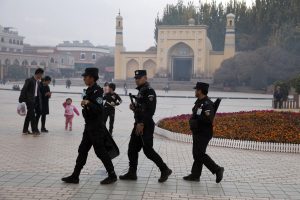By Eleanor Albert

Chinese President Xi Jinping reaffirmed his commitment to Beijing’s policies in the Xinjiang Uyghur Autonomous Region at a two-day party conference on the region last weekend. Calling for its long term implementation, Xi said that “practice has proven that the party’s strategy for governing Xinjiang in the new era is completely correct.” Xi emphasized that the government’s policies “laid a solid foundation for long-term peace and stability in Xinjiang,” echoing language used in a white paper issued by the State Council Information Office in September on employment and labor rights in Xinjiang. “Facts have fully proved that China’s work on ethnic affairs has been successful,” Xi added according to a summary of the conference by Xinhua news agency.
The use of widespread surveillance, internment camps and indoctrination programs are among the many tools wielded by Chinese authorities over the Uyghur population. The Chinese government also appears to be expanding detention centers and infrastructure, according to recent investigative reports. New reports also show that Beijing’s Xinjiang policies go further, including concrete strategies aimed at the erasure of Uyghur culture and heritage in the autonomous region. Using satellite imagery, the Australian Strategic Policy Institute (ASPI) estimates that some 16,000 mosques, representing nearly two-thirds of the region’s Islamic houses of worship, have been destroyed or damaged as a result of government policy since 2017. Other Islamic sacred sites, including shrines, cemeteries and pilgrimage routes, have also been demolished or altered.
“The Chinese Government has embarked on a systematic and intentional campaign to rewrite the cultural heritage of the Xinjiang Uyghur Autonomous Region (XUAR). It’s seeking to erode and redefine the culture of the Uyghurs and other Turkic-speaking communities – stripping away any Islamic, transnational or autonomous elements – in order to render those indigenous cultural traditions subservient to the ‘Chinese nation,’” ASPI writes.
Beijing was swift to deny that its policies amount to cultural erasure. Chinese Foreign Ministry Spokesman Wang Wenbin described ASPI’s findings as “ludicrous” and said the institute received foreign funding to support “concocting lies” about China.
Yet the West continues to lead condemnation of China’s Xinjiang policies, especially within multilateral fora. Representatives from Australia, Canada, the European Union and the U.K. rebuked Beijing at the United Nations Human Rights Council last week, voicing concern over surveillance, arbitrary detentions, camps and forced labor of Uyghurs. Last month, Chinese Foreign Minister Wang Yi faced criticism as leaders raised similar issues on his tour of five European countries, marring what was supposed to be a continued celebration of 45 years of Sino-EU relations.
Separately, the United States enacted Magnitsky sanctions against Chinese officials in July for their connection to “human rights abuse against ethnic minorities” in the region, including Chen Quanguo, the Chinese Communist Party’s top official in the autonomous region. This week, the U.S. House of Representatives passed a bill that would require publicly listed companies in the U.S. to disclose any commercial links to Xinjiang due to concerns about the use of forced labor in the region. The Uyghur Forced Labor Disclosure Act passed in a 253 to 163 vote and is now headed for the Senate.
Despite the rigorous efforts by investigative reporters, academics, and analysts alike, restricted access to Xinjiang has been an impediment to gathering further evidence on the evolution of China’s policies. In September, U.N. human rights chief Michelle Bachelet said she was in ongoing discussions with the Chinese government about a possible visit. The Emmanuel Macron government in France and the Boris Johnson government in the U.K. called on China to grant access to a U.N. fact finding mission, as leaders and diplomats met for the annual U.N. General Assembly earlier this month.
The situation remains in a holding pattern, however, as Bachelet also pressed for access in February, stating that her office would “seek to analyze in-depth the human rights situation in China, including the situation of members of the Uyghur minority.”
International opprobrium has so far failed to shake Beijing from its stance that a crackdown in Xinjiang serves the country’s stability.
No comments:
Post a Comment